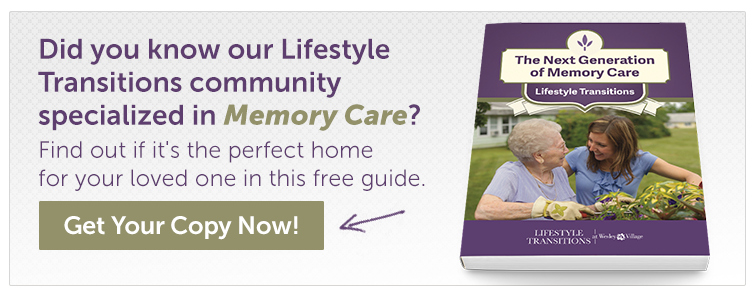Memory Support vs. Assisted Living: Which Option is Right for Your Loved One?
Trying to choose and afford a senior living community for your loved one can make your head spin. There are so many options and levels of care; how are you ever going to choose the right one?
Many people think senior living options like assisted living encompass a wide range of care and can fulfill your loved one's every need. However, there are different types of senior living, ranging from independent living to assisted living to memory care and it's important that you select the most suitable one for your family. Explore this article to learn more about the difference between assisted living and memory support communities, how your family can afford senior living options, and the amenities you can expect from a memory support community.
The Difference Between Assisted Living and Memory Care
You want to be sure that your senior loved one is receiving the level of care that’s best suited to their needs. And, it’s important to remember that everyone’s care needs are different. What might be right for one senior doesn’t meet the needs of another. That’s why it's helpful to have a good understanding of the difference between assisted living communities and memory support communities.
Let’s start with assisted living communities. You’re probably already familiar with the benefits and structure of an assisted living community. These are places where seniors can have an extra level of care when they’re no longer able to live on their own. While some assisted living communities might offer memory support, the terms are not synonymous and it most likely would not be specialized care.
Both assisted living communities and memory support communities provide the basics of care for seniors, like medication management assistance, help with daily tasks, an engaging environment, etc. However, memory support communities offer some key differences in care.
Though communities may vary in their services, often times, in assisted living, the care is scheduled care. If Mom or Dad needs assistance with medications, personal care in the mornings and showers during the week, a care plan is priced out and those services are scheduled. Additional services like escorts to meals, extended morning care, evening care or calls for assistance will be billed separately.
Memory support communities, on the other hand, are designed with the needs of seniors with Alzheimer’s disease, dementia, or other types of memory problems in mind. These seniors may have greater needs than others, often getting confused or struggling more with day-to-day tasks. Memory support communities feature 24-hour care to make sure that seniors are always attended to and confusion is minimized. These communities also have trained staff members who help with memory-specific therapy or exercises, like music therapy or memory games.
In an inclusive memory support community, there is staff caring for your loved one throughout the day. Care plans include medication management, as well as daily personal care including dressing, personal hygiene and showers—as well as impromptu requests for assistance, unexpected care needs and escorts to meals and activities throughout the day. With specialized nursing, the team is able to make more frequent changes to care plans should the individual have a fall or illness that significantly changes their care needs.
The basic difference between assisted living and memory support communities is that memory support offers attention to a specific need that not all seniors may have.
Memory Care Cost Variables
Next, before you decide which community is the better fit for your senior loved one, you’re probably wondering if you can afford senior living options. As you might guess, memory support usually comes at a higher monthly cost than that of general assisted living communities – about $5,000 per month higher on average, depending on how much care your loved one needs. If they don't need a tremendous amount of care, costs will be closer to standard assisted living pricing.
While that number may scare you, you don’t need to worry yet. There are a number of funding options available to help families afford senior living communities. These include long-term care insurance and veterans’ benefits.
Also, many memory support communities have a tiered pricing structure. This means that as your loved one requires more care, you can move them to a more dependent tier of care. So, for example, if your loved one is only in the beginning stages of dementia and still has relative independence, they won’t require as much care as they may need two or three years down the road.
This tiered pricing structure is a really helpful way for families to afford senior living communities. You only pay for the care your loved one actually needs, and you can always increase their care based on your observations and the recommendations of the community’s staff. In fact, in some cases, once seniors with memory challenges become acclimated to their routine and living in the community, their care needs might actually decrease.
While memory support does come at a higher cost, the benefit to your senior loved one justifies the price. These communities offer all-inclusive, around-the-clock care for seniors with specific memory needs. It’s hard to put a price on a comfortable life for your loved one!
Memory Support Amenities
While we touched briefly on the specialized memory therapy your loved one will receive in a memory support senior community, it’s isn’t all work and exercise. These communities offer the same amenities and activities that other senior living communities offer, all in a safe, secure environment for seniors with memory challenges.
Struggling with Alzheimer’s disease or dementia can often be frustrating and lonely for both the seniors and their family members. This is one reason memory support communities are such healthy environments for these seniors. These communities offer the structure needed to keep your loved one active and that structure can help with confusion. Seniors wake up, eat, relax in their favorite spaces, and engage with familiar activities throughout the day, establishing a comfortable schedule. In many cases, it’s hard for families to provide the level of structure and planning when other responsibilities like work and children still require your time and energy.
In addition to the structure of a carefully planned schedule, memory support communities offer peace of mind in the form of a secure place for seniors to live. Many seniors with memory challenges can get confused about where they are or the time of day, and they can even wander off. Memory care facilities have secure doors and windows, and staff members stationed at entrances and exits to guide seniors back to their rooms or common areas. You don’t have to worry about the safety of your loved one when they’re under the caring and watchful eyes of the staff.
Finally, these communities, like other assisted living communities, offer fun and socialization, which can be a challenge for seniors who live alone or no longer drive. Activities like gardening or book clubs, pet visits, concerts, outings, courtyard barbecues, and more are great ways to keep seniors active and entertained. Your senior will have more fun than ever in the safest environment possible.
Both memory support and assisted living communities have different advantages, making them ideal for different seniors. Consider your loved one’s needs carefully and choose the community option that you think is the best fit for them.
Want to learn more about the benefits of a memory support care options? Download this free e-book on Lifestyle Transitions, a top memory support community.
About Chelsea Sayegh
I started working as a Marketing Coordinator for United Methodist Homes in October of 2016. I work on public relations, website management and community planning for their award winning independent and assisted living communities. As a graduate of Ursinus College with a degree in Media and Communications and a passion for serving nonprofits, United Methodist Homes has become my home away from home. I spend my days working in a community filled with smiling faces, helpful hands and wonderful residents. I have a passion for assisting seniors and take great pride in being able to promote a company with such a positive mission and values. As an individual committed to learning and growing, I have jumped right into this exciting career!

Our Blog is a 2016 Platinum Generations Award Winner! The Generations Award is an annual international competition for excellence in senior marketing recognizing professionals who have communicated to the 50+ Mature Markets.




